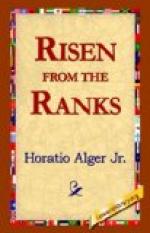Here an indescribable, unearthly noise was heard from the interior of the tree, like the wailing of some discontented ghost.
“Good heavens! what’s that?” ejaculated Fletcher, turning pale, and looking nervously around him.
It was growing late, and the branches above him, partially stripped of their leaves, rustled in the wind. Fletcher was somewhat nervous, and the weird character of the poem probably increased this feeling, and made him very uncomfortable. He summoned up courage enough, however, to go on, though his voice shook a little. He was permitted to go on without interruption to the end. Those who are familiar with the poem, know that it becomes more and more wild and weird as it draws to the conclusion. This, with his gloomy surroundings, had its effect upon the mind of Fletcher. Scarcely had he uttered the last words, when a burst of wild and sepulchral laughter was heard within a few feet of him. A cry of fear proceeded from Fletcher, and, clutching his book, he ran at wild speed from the enchanted spot, not daring to look behind him. Indeed, he never stopped running till he passed out of the shadow of the woods, and was well on his way homeward.
Tom Carver and Hiram crept out from their place of concealment. They threw themselves on the ground, and roared with laughter.
“I never had such fun in my life,” said Tom.
“Nor I.”
“I wonder what Fitz thought.”
“That the wood was enchanted, probably; he left in a hurry.”
“Yes; he stood not on the order of his going, but went at once.”
“I wish I could have seen him. We must have made a fearful noise.”
“I was almost frightened myself. He must be almost home by this time.”
“When do you think he’ll find out about the trick?”
“About the invitation? Not till he gets a letter from Miss Clinton, telling him it is all a mistake. He will be terribly mortified.”
Meanwhile Fletcher reached home, tired and out of breath. His temporary fear was over, but he was quite at sea as to the cause of the noises he had heard. He could not suspect any of his school-fellows, for no one was visible, nor had he any idea that any were in the wood at the time.
“I wonder if it was an animal,” he reflected. “It was a fearful noise. I must find some other place to practise reading in. I wouldn’t go to that wood again for fifty dollars.”
But Fletcher’s readings were not destined to be long continued. When he got home from school the next day, he found the following note, which had been left for him during the forenoon:—
“MR. FITZGERALD FLETCHER,—Dear Sir: I beg to thank you for your kind proposal to read at our Fair; but I think there must be some mistake in the matter, as we have never contemplated having any readings, nor have I written to you on the subject, as you intimate. I fear that we shall not have time to spare for such a feature, though, under other circumstances, it might be attractive. In behalf of the committee, I beg to tender thanks for your kind proposal.




